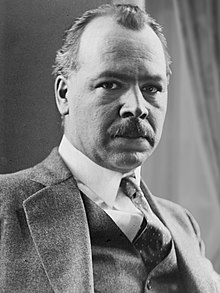Nikolai Vavilov | |
|---|---|
 Vavilov in 1933 | |
| Born | Nikolaj Ivanovich Vavilov 25 November 1887[2][3] |
| Died | 26 January 1943 (aged 55)[2][3] |
| Nationality | Russian |
| Citizenship | Soviet Union |
| Alma mater | Moscow Agricultural Institute |
| Known for | Centers of origin |
| Relatives | Sergey Vavilov (brother) |
| Awards | |
| Scientific career | |
| Fields | |
| Institutions |
|
| Author abbrev. (botany) | Vavilov |
Nikolai Ivanovich Vavilov ForMemRS,[1] HFRSE (Russian: Никола́й Ива́нович Вави́лов, IPA: [nʲɪkɐˈlaj ɪˈvanəvʲɪtɕ vɐˈvʲiləf] ; 25 November [O.S. 13 November] 1887 – 26 January 1943) was a Russian and Soviet agronomist, botanist and geneticist who identified the centers of origin of cultivated plants. He devoted his life to the study and improvement of wheat, maize and other cereal crops that sustain the global population.[4][5][6][7][8]
Vavilov's work was criticized by Trofim Lysenko, whose anti-Mendelian concepts of plant biology had won favor with Joseph Stalin. As a result, Vavilov was arrested and subsequently sentenced to death in July 1941. Although his sentence was commuted to twenty years' imprisonment, he died in prison in 1943. In 1955, his death sentence was retroactively pardoned under Nikita Khrushchev. By the late 1950s, his reputation was publicly rehabilitated, and he began to be hailed as a hero of Soviet science.[9]
- ^ a b Harland, S. C. (1954). "Nicolai Ivanovitch Vavilov. 1885-1942". Obituary Notices of Fellows of the Royal Society. 9 (1): 259–264. doi:10.1098/rsbm.1954.0017. JSTOR 769210. S2CID 86376257.
- ^ a b c d Nikolay Ivanovich Vavilov. Encyclopaedia Britannica
- ^ a b c d Вавилов Николай Иванович. Great Soviet Encyclopedia
- ^ Shumnyĭ, V. K. (2007). "Two brilliant generalizations of Nikolai Ivanovich Vavilov (for the 120th anniversary)". Genetika. 43 (11): 1447–1453. PMID 18186182.
- ^ Zakharov, I. A. (2005). "Nikolai I Vavilov (1887–1943)". Journal of Biosciences. 30 (3): 299–301. doi:10.1007/BF02703666. PMID 16052067. S2CID 20870892.
- ^ Crow, J. F. (2001). "Plant breeding giants. Burbank, the artist; Vavilov, the scientist". Genetics. 158 (4): 1391–1395. doi:10.1093/genetics/158.4.1391. PMC 1461760. PMID 11514434.
- ^ Crow, J. F. (1993). "N. I. Vavilov, martyr to genetic truth". Genetics. 134 (1): 1–4. doi:10.1093/genetics/134.1.1. PMC 1205417. PMID 8514123.
- ^ Cohen, B. M. (1991). "Nikolai Ivanovich Vavilov: The explorer and plant collector a". Economic Botany. 45: 38–46. doi:10.1007/BF02860048. S2CID 27563223.
- ^ Hawkes, J G (1988). "N.I. Vavilov the man and his work" (PDF). Plant Genetic Resources Newsletter. 72: 3–5 – via IBPGR.